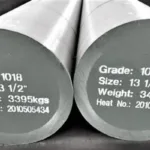16 gauge steel is a common measurement used in the manufacturing of sheet metal. The term “gauge” refers to the thickness of the material, and in the case of 16 gauge steel, it is approximately 0.0598 inches thick.
This makes it a popular choice for a variety of applications, including construction and automotive repair.
How Thick is 16 Gauge Steel?
As mentioned, 16-gauge steel has a standard thickness of 0.0598 inches or 1.5189 mm. It is important to note that the actual thickness can vary slightly depending on the manufacturing process and the type of steel being used.
16ga Steel Thickness
“16ga” is an abbreviation for 16 gauge, and it refers to the same thickness of steel as 16 gauge. This measurement is used interchangeably in the sheet metal industry to refer to steel that is 0.0598 inches thick.
The thickness of 16 gauge galvanized steel sheet is 0.0635 inches or 1.6129 mm. Galvanized sheet has higher thickness compared to standard 16 gauge steel.
16 Ga Steel Thickness
The term “16 Ga” is another way of referring to 16 gauge steel. This measurement is used to describe steel that is 0.0598 inches thick, and it is often used by metal workers and manufacturers to specify the thickness of sheet metal.

How Thick is 16 Gauge Sheet Metal?
16 gauge sheet metal has a thickness of approximately 0.0598 inches. It is a common choice for a variety of applications due to its balance of strength and flexibility.

How Thick is 16 Gauge Stainless steel sheet?
The thickness of 16 gauge stainless steel sheet is 0.06250 inches or 1.6 mm. 16 gauge stainless steel sheet is a type of sheet metal that is widely used in various industries, such as construction, automotive, and consumer goods.
The thickness of the sheet is an important factor in determining its strength and suitability for specific applications.
The term “gauge” refers to the thickness of the metal, and in the case of 16 gauge stainless steel, it has a thickness of approximately 0.06250 inches or 1.6 mm.
FAQs
Is 16 gauge steel strong?
16 gauge steel is relatively strong, and it is often used in construction and automotive applications.
However, it may not be suitable for applications that require a high degree of strength, such as heavy-duty machinery.
Is 16 gauge steel suitable for welding?
Yes, 16 gauge steel can be welded, but the process may be more challenging due to the thickness of the material.
It is important to use the proper welding techniques and equipment to ensure a successful outcome.
What is the difference between 16 gauge and 18 gauge steel?
The difference between 16 gauge and 18 gauge steel is the thickness of the material.
16 gauge steel is 0.063 inches thick, while 18 gauge steel is 0.050 inches thick.
Material Welding is run by highly experienced welding engineers, welding trainers & ASNT NDT Level III bloggers.
We strive to provide most accurate and practical knowledge in welding, metallurgy, NDT and Engineering domains.


